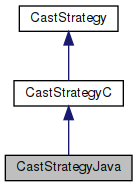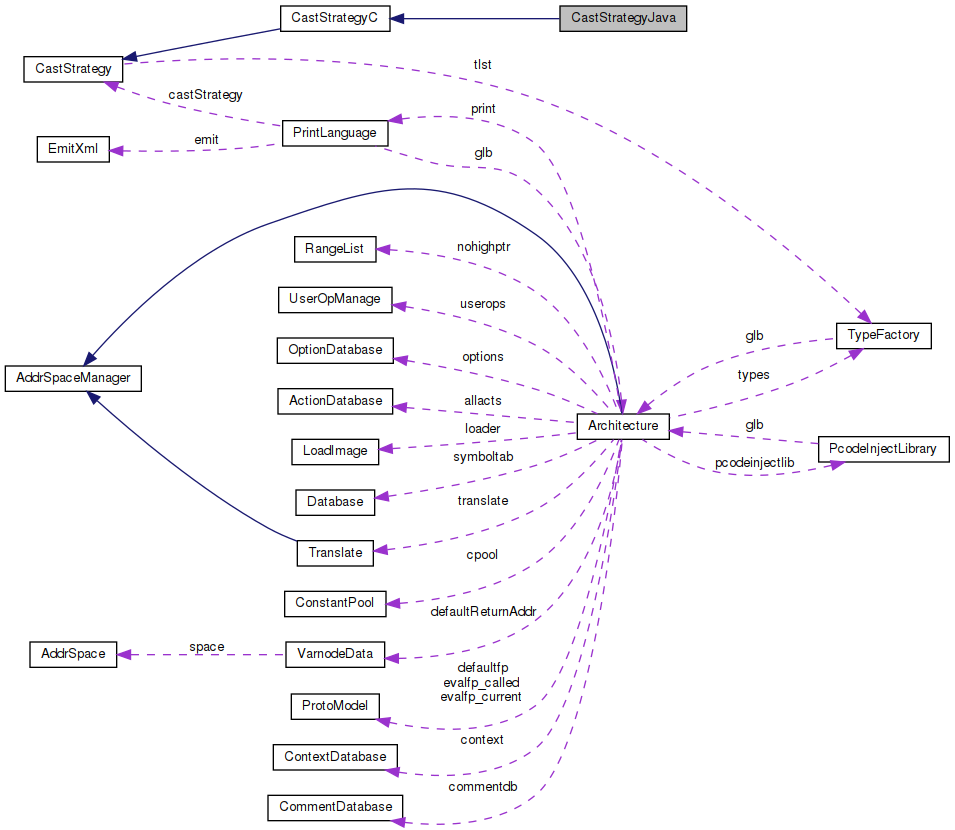Casting strategies that are specific to the Java language. More...
#include <cast.hh>


Public Member Functions | |
| virtual Datatype * | castStandard (Datatype *reqtype, Datatype *curtype, bool care_uint_int, bool care_ptr_uint) const |
| Does there need to be a visible cast between the given data-types. More... | |
| virtual bool | isZextCast (Datatype *outtype, Datatype *intype) const |
| Is zero-extending an input data-type, producing an output data-type, considered a cast. More... | |
 Public Member Functions inherited from CastStrategyC Public Member Functions inherited from CastStrategyC | |
| virtual int4 | localExtensionType (const Varnode *vn) const |
| Decide on integer promotion by examining just local properties of the given Varnode. More... | |
| virtual int4 | intPromotionType (const Varnode *vn) const |
| Calculate the integer promotion code of a given Varnode. More... | |
| virtual bool | checkIntPromotionForCompare (const PcodeOp *op, int4 slot) const |
| Check if integer promotion forces a cast for the given comparison op and slot. More... | |
| virtual bool | checkIntPromotionForExtension (const PcodeOp *op) const |
| Check if integer promotion forces a cast for the input to the given extension. More... | |
| virtual bool | isExtensionCastImplied (const PcodeOp *op, const PcodeOp *readOp) const |
| Is the given ZEXT/SEXT cast implied by the expression its in? More... | |
| virtual Datatype * | arithmeticOutputStandard (const PcodeOp *op) |
| What is the output data-type produced by the given integer arithmetic operation. More... | |
| virtual bool | isSubpieceCast (Datatype *outtype, Datatype *intype, uint4 offset) const |
| Is truncating an input data-type, producing an output data-type, considered a cast. More... | |
| virtual bool | isSubpieceCastEndian (Datatype *outtype, Datatype *intype, uint4 offset, bool isbigend) const |
| Is the given data-type truncation considered a cast, given endianess concerns. More... | |
| virtual bool | isSextCast (Datatype *outtype, Datatype *intype) const |
| Is sign-extending an input data-type, producing an output data-type, considered a cast. More... | |
 Public Member Functions inherited from CastStrategy Public Member Functions inherited from CastStrategy | |
| CastStrategy (void) | |
| Constructor. | |
| void | setTypeFactory (TypeFactory *t) |
| Establish the data-type factory. More... | |
| virtual | ~CastStrategy (void) |
| Destructor. | |
Additional Inherited Members | |
 Public Types inherited from CastStrategy Public Types inherited from CastStrategy | |
| enum | IntPromotionCode { NO_PROMOTION = -1, UNKNOWN_PROMOTION = 0, UNSIGNED_EXTENSION = 1, SIGNED_EXTENSION = 2, EITHER_EXTENSION = 3 } |
| Types of integer promotion. More... | |
 Protected Attributes inherited from CastStrategy Protected Attributes inherited from CastStrategy | |
| TypeFactory * | tlst |
| Type factory associated with the Architecture. | |
| int4 | promoteSize |
| Size of int data-type, (size that integers get promoted to) | |
Detailed Description
Casting strategies that are specific to the Java language.
This is nearly identical to the strategy for C, but there is some change to account for the way object references are encoded as pointer data-types within the decompiler's data-type system.
Member Function Documentation
◆ castStandard()
|
virtual |
Does there need to be a visible cast between the given data-types.
The cast is from a current data-type to an expected data-type. NULL is returned if no cast is required, otherwise the data-type to cast to (usually the expected data-type) is returned.
- Parameters
-
reqtype is the expected data-type curtype is the current data-type care_uint_int is true if we care about a change in signedness care_ptr_uint is true if we care about conversions between pointers and unsigned values
- Returns
- NULL to indicate no cast, or the data-type to cast to
Reimplemented from CastStrategyC.
◆ isZextCast()
Is zero-extending an input data-type, producing an output data-type, considered a cast.
Data-types must be provided from the input and output of an INT_ZEXT operation.
- Parameters
-
outtype is the output data-type intype is the input data-type
- Returns
- true if the INT_ZEXT should be represented as a cast
Reimplemented from CastStrategyC.
The documentation for this class was generated from the following files:
- cast.hh
- cast.cc
 1.8.13
1.8.13